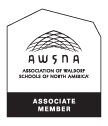Modeling Real Work in the Kindergarten
by Isaac Kemsley, Kindergarten Teacher, Madrona School, Bainbridge Island, Washington
Children before the age of seven learn much of their foundational skills from imitating the adults in their environment. The young child is a being of the senses; absorbing the sights, smells, sounds, and tactile sensations of their immediate surroundings. They build upon those sensory inputs, through the regular practice and imitation of what they observe.
Language is learned this way, from infancy onward. Gross and fine motor skills are likewise developed from following the lead of those surrounding them. Crawling, then walking, are pursued to achieve locomotion like their siblings and parents. Hand-eye coordination begins in infancy and continues through the years, gradually sharpening to a finely measurable point in adulthood.
Sometimes, we can mistake this inborn drive to imitate skill building, as early readiness. Reading, computing, and other adult activities are seen as worthy of emulation by the young child because they are of importance to the adults in their lives. However, we would never allow our children to drive an airplane or garbage truck because they are enthralled by the power invested in those activities. First they must develop the foundational skills that precede those adult activities.
That is why Waldorf Early Childhood Teachers make a conscious effort to model work that is important to skill building in the young child, that has at least an element that can be taken up by them beside the teacher as they move through the day. Cooking, cleaning, preparing our activities and space, tidying, mending and repairing, all of these activities are made available to the children as we do them throughout our day. The children dabble, in child-sized portions, with trying real work and then quickly translate it into their imaginary play world to process and practice these new skills.
Teacher Jamie cooks each day, including the children in certain stages of her snack preparation. They are able to take part in the washing, peeling, chopping, mixing, kneading, and tasting of our daily dishes. They then take those skills to the mud kitchen to practice and hone their newfound skills, “cooking” for one another.
I tidy and shovel and rake and whittle and create and mend broken toys. When the weather cools, I chop wood and build fires in the fire pit to keep our hands warm. The children join me in these activities to serve the group, creating their own toys and maintaining their environment.
This year we are lucky to have had the gift of the careful and deliberate workers of the Periscope Woodcraft team crafting our new play structures and shelters all around us this fall. The children observe the skilled work being done in their presence and then emulate the craftsmanship in their play.
I have witnessed the children shoveling and raking wood chips, hauling wood to build shelters of their own, and most recently using wooden mallets and chisels to chip away at the cast off portion of a log. These are all things that they have observed the work crew engage in during the class day and are all activities that build and strengthen their coordination skills and cooperative relationships.




